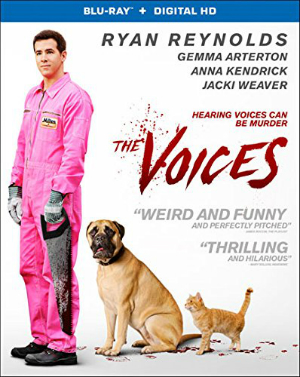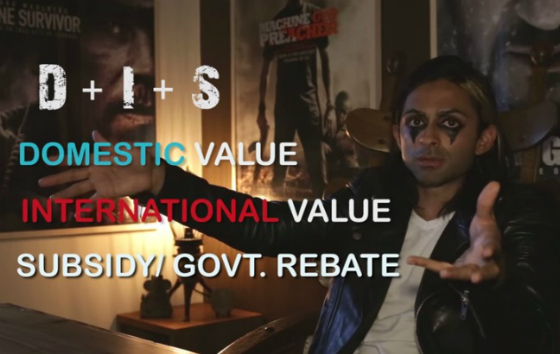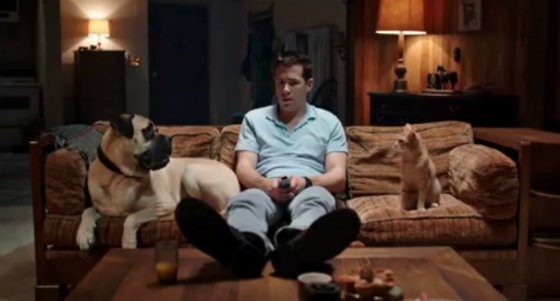TR Interview: Dredd Producer Adi Shankar on How The Voices Is His Garfield-Meets-Deadpool
 |
You might not know producer Adi Shankar’s name, but you know his work. Dredd first and foremost, of course, but also his “bootleg universe” shorts featuring characters he doesn’t own the rights to, like Venom, Punisher, the Power Rangers and James Bond.
The Voices, out on DVD and Blu-ray tomorrow, is not on the face of it a comic-book property, but a very dark comedy starring Ryan Reynolds as a schizophrenic who kills women at the behest of his pets. Yet its roots are more comic-based than you’d think – Persepolis creator Marjane Satrapi is the director, and as Shankar revealed to us, his inspiration came very much from some familiar properties.
Shankar, who also acts in the film, was kind enough to talk to us about it all.
LYT: When I was done watching The Voices, I was surprised to see your name in the acting credits. I was wondering, do you wear the face paint in your videos so that when you act you completely blend into the scenery and people don’t notice?
AS: [laughing]No. No, no, no, no, no, no. But in the acting, in The Voices in particular, that was my choice to have the braces put in and the goatee, and basically use my Indian accent. I didn’t want to be recognized in the role.
LYT: Right – which totally worked!
AS: Thank you, man. Thank you – that really means a lot to me. I went to school for acting and it’s a passion of mine. I never really thought I’d be able to actually do anything with it until Marjane called me up one day and was like, “Hey, I really want you to be in my movie – be in this movie.” I was like, “OK.”
LYT: Is it frustrating being known as a producer and not being able to pursue acting auditions as much? Do you worry that you might get seen as M. Night Shyamalan in Lady in the Water, where he cast himself as the writer who was going to save the world?
AS: Actually, thank you for asking that. Yes, it’s incredibly frustrating, in the sense that it was actually a huge chip on my shoulder for a number of years, until it dawned on me that I have a lot of actor friends who are just super–let’s call it famous, and household names – that whole thing – who think of themselves as more than just – “Hey, I’m more than just this famous face. I want to write and direct and produce.”
I came to realize that this is an issue that is not just unique to me. Imagine how Ben Affleck was received when he was like, “Yes, I want to direct a movie now.” “I’m sorry – you’re Ben Affleck, you’re not allowed to direct a movie.”
 |
LYT: Yeah.
AS: So it’s a little frustrating, or it was. Then at the end of last year, I was cast in two pretty big roles back-to-back. It’s gotten to the point, towards the end of last year, where I didn’t feel like a producer anymore, I just actually felt like an actor, because I literally spent two months acting. Hopefully I’ll get to the point where I’m seen as a multi-hyphenate.
LYT: Right. We ran that video on our site where you really laid out the economics of putting together a movie in really nice, concise terms. So based on what you just said, when you’re shopping around movies, how do people react when people say “Ben Affleck is the director of this” for the first time. Is that not a saleable point? Is it a saleable point?
AS: Honestly, the traditional foreign sales model is so ass-backwards. It’s more about faces on a poster than about the artistic process, right?
LYT: Right.
AS: So I don’t think people really care so much about Ben Affleck being a saleable point more so than “Oh, OK, are you going to be in it? Are you going to get Matt Damon in it?” You know what I mean?
LYT: Yeah.
AS: From the artistic community standpoint, you and I are going “Oh, can he actually deliver? Will this be a good movie?” From the distributor’s standpoint, all they’re seeing is a guy with a rolodex.
LYT: Right. I just wonder if they maybe see that they can put Ben Affleck’s name on the poster in one way or another, and that’s a saleable point?
AS: Totally, totally. Absolutely.
LYT: So when you’re putting together something like The Voices…
AS: Look at it this way – it’s really hard for a first-time director to get a movie off the ground. It just is, because there’s no track record. There’s nothing. That’s why most first-time directors make really small movies, right?
LYT: Oh, yeah.
AS: Like, You’re Next. You’re Next is a perfect – I know that wasn’t Adam [Wingard] and Simon’s [Barrett] first movie, but it might as well have been one of their first movies. You know what I mean?
LYT: Yeah.
AS: It’s a small movie, it gets them noticed, and they get to do something bigger.
LYT: Yeah. You base the marketing on the iconography of the sheep mask, basically.
AS: Yeah, yeah. But you’re not actually selling it, because it’s such a small movie, you’re kind of just scrapping it together and putting it together and making it.
LYT: Yeah.
AS: To be able to do a movie where you have a bigger budget, and there’s a more traditional financing plan, right?
LYT: Yeah.
AS: So it’s so difficult. So you go, how does a first-time film maker with no real feature-length track record get a $30, $40, $50 million dollar movie off the ground? It’s next to impossible, but then it happened on District 9. because Peter Jackson’s name was slapped on the poster. I mean, he obviously did a ton of work and whatnot, so I don’t mean ‘slapped’ in kind of a bad way. It just comes down to dollars and cents in marketing.
LYT: So on paper, something like The Voices would seem far less commercial than even something like Dredd. How did you – what were the economics of putting it together?
AS: Well, it’s a much lower budget than Dredd, right?
LYT: Right.
AS: I mean, it’s hard, because The Voices, at the end of the day, is not on paper that commercial of a movie. It’s going for a specific audience, right?
LYT: Yeah.
AS: The early reviews were like “This is destined to be a cult hit.” I’m like, that’s great. Everything I’ve ever done ends up being a cult hit, which is weird. You want it to be a mainstream hit, and then it doesn’t, but then all of a sudden there’s this weird subsection of the culture that loves it. It’s kind of funny, I know.
But as far as The Voices, that’s a really complicated answer, man. I could make a video about it. Seriously, if you want me to make a video about it, I will.
LYT: Oh, sure.
AS: I’ll make a video about it, because it’s really complicated. A bunch of people will be mad at me if I make a video about it, but fuck it. I’ll just do it.
[NOTE: Shankar later clarified via Twitter – below – that if he made such a video, it would not be immediately. But we’ll keep our eyes out.]
@ToplessRobot Oh I meant I would do it down the road. Will send you the link when I make it. Won't be for a while. Great chatting w/ u :).
— Adi Shankar (@adishankarbrand) April 5, 2015
LYT: Also, you’re not – it’s so totally different from what Marjane’s fans might expect as well. I guess it would be harder to sell it based on the director, because it’s such a departure for her, too.
AS: Yeah. In a weird way, it’s a departure for me, as well.
LYT: It’s your only comedy really, isn’t it?
AS: Yeah, and we didn’t really go into it thinking of it as a comedy. We didn’t go into it thinking it was anything. It was almost like undefineable, if you will. But what’s interesting is Ryan Reynolds is basically playing Deadpool.
LYT: That’s true enough.
AS: That’s what I kept telling him on set. I was like “Dude – you’re basically playing Deadpool.” I look at this movie in a weird way. Actually, it’s not my only comedy. “Truth in Journalism” had comedic elements as well. So did “Superfiends.”
 |
LYT: Yeah. I was thinking in terms of features, but yeah.
AS: Actually, I always look at this movie, weirdly enough, as a bootleg.
LYT: So it’s like a stealth bootleg Deadpool is what you’re saying.
AS: No, no, no, no. More like Garfield.
LYT: Garfield without Garfield?
AS: No, Garfield the cat. Like Mr. Whiskers is Garfield, and he’s telling Jon to – you know the theories that really Jon is insane, and he thinks Garfield and Odie are talking.
LYT: Yeah, there’s this comic called Garfield Minus Garfield, where it’s him talking to himself, and they’ve just digitally erased Garfield from each strip.
AS: Yeah. Oh, shit – is that a comic book?
LYT: It’s a bootleg thing. It’s a thing online, where somebody has just deleted the actual pictures of Garfield from Garfield strips so it is just Jon talking to himself.
 |
| Jim Davis/Garfield Minus Garfield |
AS: Oh, wow. Yeah, well, that’s how I viewed The Voices. I was like, this is bootleg Garfield, with Ryan Reynolds playing Deadpool as well.
LYT: And that is actually a great pitch.
AS: Yeah. Wish the studio had used that in the marketing.
LYT: Did you pitch it as that to anybody in the pitching stage?
AS: You know, that would have gotten zero traction to anyone outside of the fanboy community. Literally, everything I just said made perfect sense to you, right?
LYT: Yup.
AS: But if I was on with – I don’t know, Entertainment Weekly, or some site that reports on what Kim Kardashian did yesterday, literally what I said might as well have been Chinese.
LYT: I think I know the answer to this, but do you think people sort of vastly overrate the influence that the fanboy audience has today?
AS: No, I don’t think they do. I think what they do is they actually weirdly underestimate it. I actually think they underestimate it in a lot of ways. I think they overestimate it in the wrong ways. They overestimate the reach, they underestimate the pull.
LYT: Can you elaborate on that a little bit?
AS: [pausing]I’m trying to think how to phrase it.
LYT: The way I’ve always described Comic-Con to friends in the movie industry is that it’s not going make or break your movie, but it’s like when the Republican candidate speaks at Bob Jones: it’s shoring up your base.
AS: Right. Yeah, mm-hmm. Exactly. It’s like when you show up at the conventions – the national convention, right?
LYT: Yeah.
AS: You hit all the right talking points, or whatever. It’s not like anyone outside of the base is really going to hear that. But at the same time, if you’re really a fresh voice, and the base really connects with you, or connects with what you’re saying, that – call it a vocal minority, call it whatever you want – is really going to go all out and help that message spread.
LYT: Yeah. I just saw that ReedPOP is having their first big Comic Con in China. Does that – do you think that is something that will change the economic game down the line?
AS: Yeah, I think so. China’s a massive market.
LYT: Is the fanboy community starting to exert a bigger influence in foreign markets, versus maybe just domestic?
AS: Oh, yeah! 300%. I mean, I’m a foreigner, right? I was influenced by American culture, but it wasn’t Schwarzenegger, it wasn’t Planet Hollywood, it was X-Men, and Power Rangers, and Captain Planet, and The Crow.
LYT: I guess my last question is how do your bootleg movies affect your economics, if they do? Do they raise your profile to the point that it’s easier to sell your other stuff? Or are they just for fun? Do they lose you money?
AS: It’s literally just for fun. It’s a creative exercise. It’s, like, there is no agenda, there’s no business model. It’s just literally self-expression.
LYT: Well, we look forward to the next one of those as well. Thanks.
AS: Thank you, man. Appreciate it!
—
THE VOICES comes out on Blu-ray tomorrow – and we will have one to give away. Be ready, because you won’t want to miss this one…
